“Get the fish on the reel,” the guide said, picking up his net, moving to my side, letting me know he was just as serious about this as he was when he told me trench foot was a genuine risk up here, even in July.
“That’s a flarkên brook trout?” I asked, or, well, screamed, actually.
“Don’t let it under the boat,” he answered.
Five, ten, fifteen, maybe twenty minutes later, I don’t remember, the fish was in the net, and I was sitting on the casting platform, not remembering how I got there, just trying to stop my hands from shaking.
Now the fish was on the bump board, and I asked that question again. The one about it being a flarkên brook trout.
“Twenty-four and seven eighths, maybe even fifteen sixteenths,” the guide said. “I won’t call it twenty-five, but you can, and should.”
Then he pulled a tape measure from a box, the kind a seamstress or tailor uses, and wrapped it around the fish’s belly.
“Sixteen inches.”
He looked at me, looked at my boat mate, then shook his head.
“Sixteen inches,” he said again, stretching it out like three words instead of two.
“That’s a lot?” I asked.
“Damn right, that’s a lot.”
My boat mate got out his phone and typed the numbers into the calculator, or maybe an app made especially for that sort of thing. I didn’t know.
“Eight pounds,” he said. “That’s an eight-pound brook trout.”
I’ve written two stories about catching the biggest brook trout of my life: “How to catch the biggest brook trout of your life,” and “How to catch the biggest brook trout of your life, again.” The length of my first biggest brook trout was an inch less than this one’s girth. The length of my second was an inch longer. The guide said this fish would likely be the boat’s largest of the season. But he’d gotten a bigger one just last year. Fish over twenty inches, he said, aren’t that rare anymore.
How can that be? I thought. Aren’t we talking about brook trout? Those little speckled beauties Cormac McCarthy said wore “maps of the world in its becoming” wrapped over their bodies?
Evidently, since Ontario got serious about helping coasters make a comeback in Nipigon, brook trout over twenty inches are no longer the unicorns they used to be. Now, like they were back in 1915, when Dr. W. J. Cook caught one that was thirty-one and a half inches long and twenty-three inches around, big brook trout are more like bald eagles in Michigan. They aren’t everywhere, but if you really want to see one, you will. Over four days, I lost track of how many fish I caught that were longer than a foot and a half. Partly due to my tracker, whose storage capacity has wilted like a dandelion in August, but mostly because these fish have become the piscatorial equivalent of corn-fed Iowa farm boys.
With Nipigon being at the top of Lake Superior, and my home on Michigan’s Keweenaw Peninsula being somewhat at the bottom, I live about 120 miles from where I caught that fish. Still, it took over ten hours to drive there because I was in an SUV, not a boat. But, man, if I had a boat, maybe I could catch fish like that here, on my side of the lake. Right?
They say the two happiest days in a fella’s life are the day he buys a boat and the day he sells it. You can’t have the second until you have the first, so on a rainy day in August, I gave the friendly guy at the Lund dealer a check, and he gave me a boat. Just two guys, sealing the deal with a handshake, each having one of the two best days of their lives.
With a new boat, hundreds of miles of shoreline within an hour of my house, and two mysterious denominations of voodoo called Spot-Lock and Contour Follow possessing my boat, I’d soon need a case of Mueller straps and sleeves to manage the tennis elbow I’d get from all the casting and catching. Right?
After nearly thirty years of fishing in rivers and streams, I’ve gotten pretty good at reading water and finding fish. Even when there’s not a hatch. You see, I know how to prospect, thanks to Tom Rosenbauer’s book on that topic. But lakes, especially in late summer and early fall, are different. The fish can be deep, really deep, and I’m not the kind to use bowling balls, wake boards, and seven-strand, eighteen-gauge wire to catch a fish. So, trip after trip, I kept telling myself I’d figure it out, but if I didn’t, this was a mighty fine way not to catch fish.
I told my story to the guys in the hockey locker room one afternoon, hoping to get some advice on where and how to fish. Many of those guys were born here. Raised here. If they couldn’t help me, they surely knew someone who could. All I needed was a tip on a spot, a time of day, or a moon phase. Simple stuff.
“The boat’s probably a lemon,” one said, then offered to buy it for half of what I paid. He’d be doing me a favor, he said.
“It’s your fault for using those fly rods,” another said, ignoring, or not believing, my previous stories about catching all of those brook trout in Canada on flies. Most on dries.
“You know, Tim,” yet another said. “You got the right tools, but you need more practice. You know what they say about experience? Experience is that thing you get right after you need it.”
It was a kind of wisdom that makes sense in corporate board rooms and academic tenure reviews, but turns out to be a buzzkill in a hockey locker room.
“Hey, Doc,” another guy said, planting a pole off the stern so he could move the boat in a different direction. “You bury any horses lately?”
“As a matter of fact,” Doc said, “I put one down yesterday. Poor thing fell into the hole before I got all the drugs in it, so I had to crawl down there to finish. It’s never an easy thing, burying a horse.”
“My neighbor once asked me to help bury their horse,” one of the eight other guys in the room said. “Doc probably knows this, but for the rest of you, just be sure you dig the hole deep enough. Trust me on that. Once the horse is down there, it’s harder than hell to make that hole any deeper.”
This can’t be happening, I thought. Eight guys in a room, nine counting me, and two of them have buried a horse. Doc? Sure. But the other guy is a CEO or president or something like that.
“You really need to use a backhoe,” another guy said, this one a master electrician. “I did it once with a dozer. Man, I’ll tell you, you have to dig a long hole if you use a dozer. And it’s a lot of work to fill the hole back in after you put the horse in there.”
“So, Tim,” another guy said. “Do you see the connection to your fishing woes?”
“I absolutely do not,” I said.
“Good, because if you did, I’d worry about you. It’s already bad enough that you use a fly rod out there. You’re like those folks who use chopsticks, even after seeing a fork. Or change their own oil. Or trust artificial intelligence instead of the real stuff.”
“So there’s no lesson?” I asked.
“Oh, yeah, there’s a lesson,” he said. “You should probably go back to Canada, where the big brook trout are. There are no big fish here.”







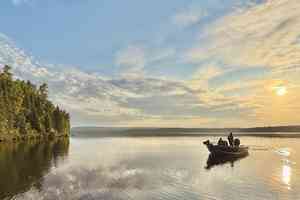







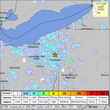



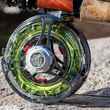
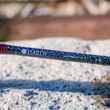



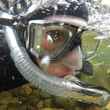

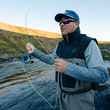

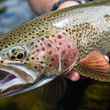
Comments